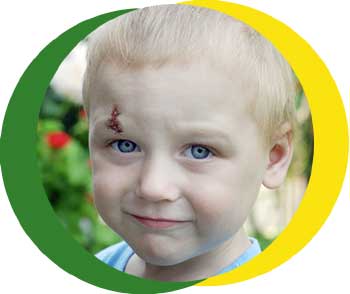Head Injury

- Most head injuries are not serious and simply cause a bump or a bruise
- If your child’s head is bleeding, apply pressure for 5-10 minutes. If it continues to bleed, they may need to have it glued (stitches are very rarely required). This can usually be done in a minor injuries unit, an urgent treatment centre or a walk in centre. Some GPs also assess and treat minor injuries
- A significant head injury can result in concussion. A child or young person does not have to have been unconscious, or “knocked out” for concussion to occur. Common symptoms of concussion include headache, fatigue, poor sleep and difficulty concentrating / learning
Operation Ouch – Head Injury
When should you worry?
If your child has had any of the following in the 48 hours following their head injury:
- Vomits repeatedly i.e. more than twice (at least 10 minutes between each vomit)
- Becomes confused or unaware of their surroundings
- Loses consciousness, becomes drowsy or difficult to wake
- Has a convulsion or fit
- Develops difficulty speaking or understanding what you are saying
- Develops weakness in their arms and legs or starts losing their balance
- Develops problems with their eyesight
- Has clear fluid coming out of their nose or ears
- Does not wake for feeds or cries constantly and cannot be soothed
You need urgent help
Go to the nearest Hospital Emergency (A&E) Department or phone 999
If your child has had any of the following in the 48 hours following their head injury:
- Develops a persistent headache that doesn’t go away (despite painkillers such as paracetamol or ibuprofen)
- Develops a worsening headache
You need to contact a doctor or nurse today
Please ring your GP surgery or call NHS 111 – dial 111
If your child:
- Is alert and interacts with you
- Vomits, but only up to twice
- Experiences mild headaches, struggles to concentrate, lacks appetite or has problems sleeping – if you are very concerned about these symptoms or they go on for more than 2 weeks, make an appointment to see your GP
Self care
Continue providing your child’s care at home. If you are still concerned about your child, call NHS 111 – dial 111
What should you do?
- In general, if your child cries immediately after a head injury and returns to their normal self in a short time, they can be managed at home. You should observe them closely for the next couple of days, checking that they are responding normally to you. They may be pale or quieter than normal for the first couple of hours after a head injury – this is normal
- If your child is under a year of age, begins vomiting, has a headache that is getting worse, is behaving oddly or has fallen from a height taller than they are, they will need to be seen urgently by a medical practitioner. Call your GP surgery or ring NHS 111
- Let your child rest and try to avoid strenuous activity until their symptoms have settled
- Give them paracetamol (calpol) and/or ibuprofen as per the instructions on the packaging if they are in pain
- If your child has been concussed, a graded return to normal activities/school is always recommended. It is best to avoid computer games, sporting activity and excessive exercise until all symptoms have improved
- For more information visit The Children’s Trust website: they are the UK’s leading charity for children with brain injury. They deliver rehabilitation, education and community services through skilled teams who work with children and young people, and their families.
Learning to spot when a bump is a concussion
Most head injuries are not serious but bumps do happen. The Children’s Trust provide information that shares the signs to look out for, and steps to take, in case your child has had a concussion. View the resource
How long will your child’s symptoms last?
- Your child is likely to return to normal within a few hours of a minor head injury
- In the few days following a more significant head injury, your child may experience mild headaches, might be irritable, may struggle to concentrate, may lack appetite and may have problems sleeping. If these symptoms go on for more than 2 weeks, make an appointment to see your GP
Where should you seek help?
- If your child is under a year of age, begins vomiting, has a headache that is getting worse, is behaving oddly or has fallen from a height taller than they are, they will need to be seen urgently by a medical practitioner. Call your GP surgery or ring NHS 111.
- If your child has any of the above features, they need urgent help. Call 999 or go to the nearest hospital emergency department.

